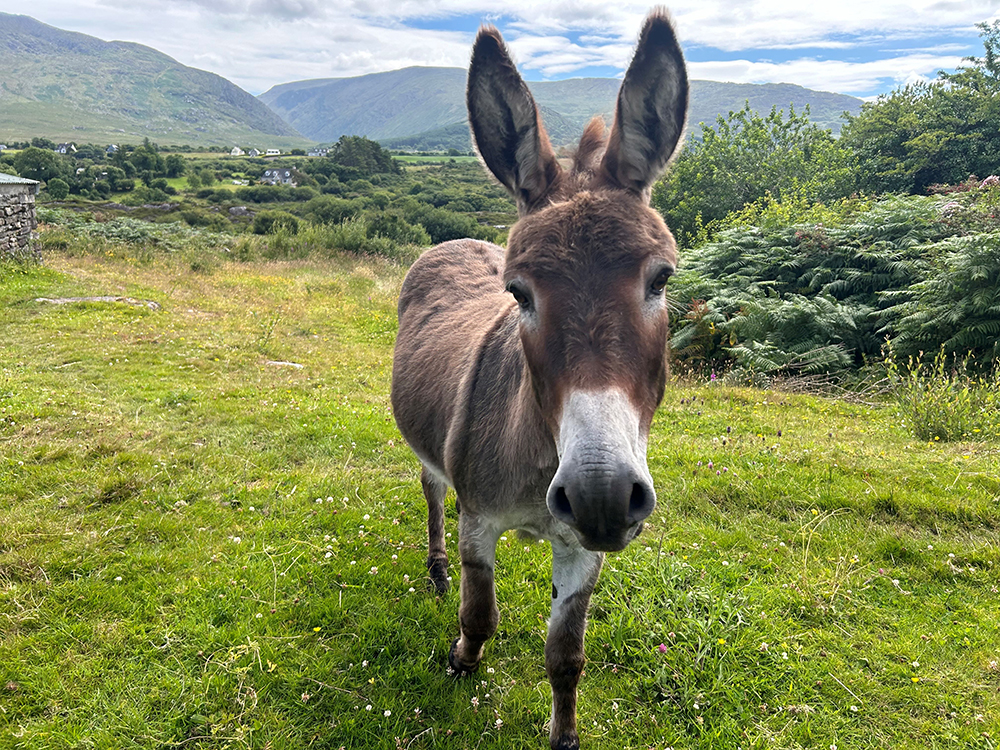Paige Condy - Ireland

This summer, I was fortunate enough to spend many weeks at The Donkey Sanctuary, Ireland. The Donkey Sanctuary is an organization dedicated to improving the welfare of donkeys worldwide.
The Donkey Sanctuary Ireland opened in 1987 and has provided care for over 5,600 neglected and abandoned donkeys across Ireland. Currently, The Donkey Sanctuary Ireland has over 1,700 donkeys and mules in their care across multiple locations.
My day-to-day at the sanctuary involved arriving in the morning at the farm where the veterinary department is based out of. There, the veterinarians and nurses would discuss the current hospitalized donkeys as well as any other donkeys who were on medications or needed additional care. After this, the nurses would give donkeys their morning treatments. By joining them in this morning round, I was able to learn more about the donkeys being housed at the sanctuary and how they manage the medical conditions of the donkeys in their care.
Because The Donkey Sanctuary promises lifelong care for the donkeys at the sanctuary, geriatric donkeys or donkeys with chronic health concerns are closely monitored to ensure their welfare. After the morning round, I would join one of the veterinarians depending on the current case load. Sometimes this involved rechecking donkeys at the various farms or addressing new health concerns.
I also had the opportunity to observe multiple farriers and learn how different hoof conditions are managed. This involved taking and interpreting radiographs of the hooves. Some days, I was able to shadow the registered dental technician who provided routine tooth care for the donkeys. I was able to learn about routine maintenance of donkey teeth and the importance of dentistry. I also was involved in more advanced dentistry such as extractions. I really enjoyed this part of my experience because it was very hands-on, and I got to learn from various experts. Some additional aspects of veterinary medicine I got to learn about is ophthalmology and dermatology. Eye and skin problems are common in donkeys, and the employees at the sanctuary make sure to point out any concerns so that they can be treated right away. I also got to help with intake in the “New Arrivals” unit.


During this time, I was able to practice performing physical examinations and basic health screenings for the new additions to the sanctuary. This also included routine bloodwork. In addition to shadowing the veterinarians and nurses, I was able to work with a behavior specialist and learn about different donkey behavior. This included doing bonding assessments on donkeys to determine certain groups or herds that would meet both the donkey’s social needs and medical needs. I also got to assist with desensitizing fearful donkeys around veterinary equipment by giving them treats and positive reinforcement so that they begin to associate people and veterinarians positively. Including behavior in this global experience helped me get a well-rounded view of donkey health and welfare.

I also had the opportunity to join a Donkey Welfare Advisor in the field. DWAs will visit donkeys in the community and help respond to welfare concerns. During these days, we would drive out to various locations and respond to different community needs. This ranged from good Samaritans reporting concerns in a donkey’s welfare to visiting donkeys and providing care as requested by their owners.
Being able to work with donkeys outside of the sanctuary allowed me to learn about real-world welfare concerns and provided an additional perspective. One thing I really appreciated was being able to learn about both individual and population health. Because there are so many donkeys at the sanctuary, it is important to have ways to assess the health of the entire population and the individual donkeys. I was able to learn so much during my summer and I am grateful to The Donkey Sanctuary Ireland for hosting me and for the UC Davis SVM Global Programs for supporting me in my summer experience.
